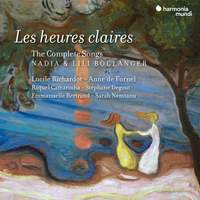Recording of the Week,
Nadia & Lili Boulanger - Les heures claires
Asked to name a composer who I wished had left a more substantial body of work recently, I hedged my bets slightly by going with ‘Boulanger’ (first name deliberately unspecified). For me, it’s impossible to hear virtually any of the music produced by the sisters Nadia and Lili throughout the 1910s without fervently wishing that their compositional careers hadn’t been cut so short: in Lili’s case by her death aged just 24, and in Nadia’s by a lack of belief in the quality of her music. (Not that anyone could accuse her of not channelling her formidable energies in a fruitful direction – as one of the most influential teachers of the twentieth century, her incredible roster of students included Aaron Copland, Astor Piazzolla, Gian Carlo Menotti, Thea Musgrave, Jean Françaix and Philip Glass as well as John Eliot Gardiner, Dinu Lipatti and Clifford Curzon).
The last few years have seen several superb albums dedicated to the songs of both sisters (notably from Cyrille Dubois & Tristan Raës on Aparte, and Nicholas Phan & Myra Huang on Avie), but today brings the most comprehensive single-volume anthology of their vocal and instrumental music to date – a collection of the complete songs on Harmonia Mundi, prepared in association with the indefatigable Palazzetto Bru Zane and featuring a handful of world premiere recordings (all of them gems).
 The lion’s share of the songs is here assigned to the French mezzo Lucile Richardot, perhaps best known for her work in baroque repertoire. Hers is a richly-coloured, characterful voice, and she mines every nuance of these texts (by poets including Verlaine, Maeterlinck, Samain and Silvestre) for all their worth: there’s a lovely, liquid lyricism to the calmer, more reflective songs such as Nadia’s ‘Ilda’, ‘Versailles’ and ‘Cantique’, but elsewhere she’s not afraid to roughen up the edges when needed.
The lion’s share of the songs is here assigned to the French mezzo Lucile Richardot, perhaps best known for her work in baroque repertoire. Hers is a richly-coloured, characterful voice, and she mines every nuance of these texts (by poets including Verlaine, Maeterlinck, Samain and Silvestre) for all their worth: there’s a lovely, liquid lyricism to the calmer, more reflective songs such as Nadia’s ‘Ilda’, ‘Versailles’ and ‘Cantique’, but elsewhere she’s not afraid to roughen up the edges when needed.
‘L’Échange’, setting a text by Camille Mauclair and depicting a distinctly toxic dalliance between a maudlin drunk and a vulnerable woman with stark realism, sees her delving into a raspy chest-voice to startling effect, and in the bleak Verlaine setting ‘Désespérance’ – one of the songs receiving its world premiere recording – she leans into a louche, almost cabaret-ish style of delivery which only serves to underline the mood of desolation.
 There are also numerous distinguished appearances from baritone Stéphane Degout, who first crops up in the sole duet on the menu, Nadia’s ‘Allons voir sur le lac d’argent’ (a fractious little dialogue between a shepherdess and her would-be swain) and shares the title-work with Richardot on Disc 2: perhaps an unorthodox artistic decision, but one which works beautifully. He’s also in imposing, brooding form in two of the three Heine settings which immediately precede it - and put me very much in mind of Clara Schumann’s responses to the same poet.
There are also numerous distinguished appearances from baritone Stéphane Degout, who first crops up in the sole duet on the menu, Nadia’s ‘Allons voir sur le lac d’argent’ (a fractious little dialogue between a shepherdess and her would-be swain) and shares the title-work with Richardot on Disc 2: perhaps an unorthodox artistic decision, but one which works beautifully. He’s also in imposing, brooding form in two of the three Heine settings which immediately precede it - and put me very much in mind of Clara Schumann’s responses to the same poet.
The second disc introduces a third singer in the form of Portuguese light lyric soprano Raquel Camarinha, whose piercing sweetness is a welcome foil to the two lower voices and makes gorgeous work of Nadia’s turbulent ‘La Sirène’ and her luminous ‘Prière’. She gets a more substantial opportunity to shine on Disc 3, in the form of Lili’s extraordinary song-cycle Clairières dans le ciel (excerpts from which featured on Sandrine Piau and David Kadouch’s Voyages a couple of weeks back): her small but perfectly-formed voice is eminently suited to the meditation on the ‘Black Madonna’ in ‘Au pied de mon lit’ (shades of Duparc’s harmonic language here) and channels a nervy energy in ‘Un poète disait’, although the Tristan-influenced final song perhaps pushes her to her vocal limits.
The pianist throughout is the ever-imaginative Anne de Fornel, who makes much of the almost minimalist ostinatos and rippling arpeggio motifs which Nadia so favoured and also rises superbly to the challenges of the more virtuosic writing in songs like ‘C’était en juin’ (Les heures claires) and ‘Le Retour’ (depicting a homeward-bound Ulysses). With equally ravishing contributions from violinist Sarah Nemtanu (including what is possibly Lili’s best-known work, the oddly puckish Introduction et Cortège) and Emmanuelle Bertrand (who gives Nadia’s own arrangement of ‘D’un soir triste’ for cello and piano its first outing on record), it all adds up to a classy celebration of the sisters’ legacies.
Lucile Richardot (mezzo), Stéphane Degout (baritone), Raquel Camarinha (soprano), Emmanuelle Bertrand (cello), Anne de Fornel (piano)
Available Formats: 3 CDs, MP3, FLAC, Hi-Res FLAC



